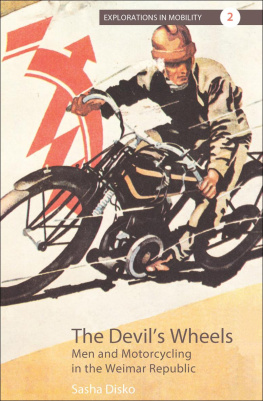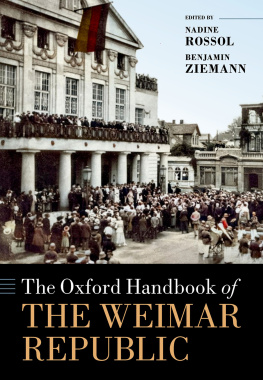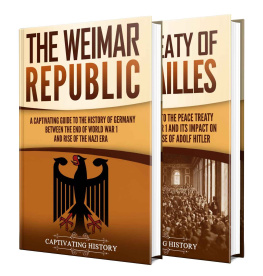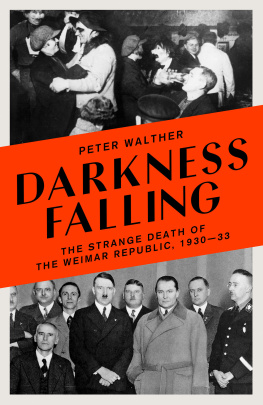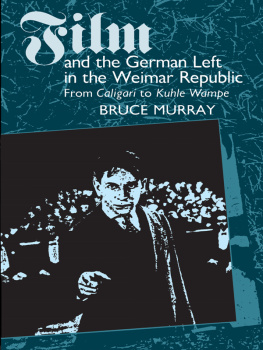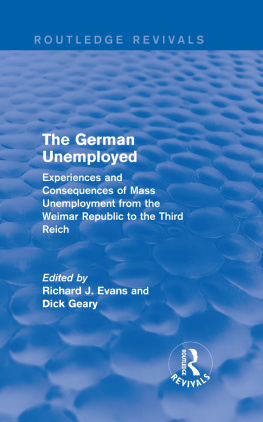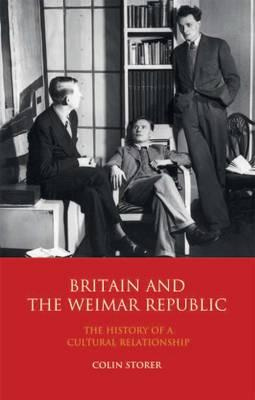THE GRAVEDIGGERS
THE GRAVEDIGGERS
THE LAST WINTER OF THE WEIMAR REPUBLIC
RDIGER BARTH
AND
HAUKE FRIEDERICHS
Translated by Caroline Waight

First published in Great Britain in 2019 by
Profile Books Ltd
29 Cloth Fair
London EC1A 7JQ
www.profilebooks.com
First published in Germany in 2018,
entitled Die Totengrber: Der letzte Winter der Weimarer Republik
by S. Fischer Verlag
Copyright S. Fischer Verlag GmbH, 2018, 2019
Endpaper map Peter Palm, Berlin/Germany
Translated by Caroline Waight
The moral right of the author has been asserted.
Cover image Mary Evans Photo Library
Cover design: Estuary English
All rights reserved. Without limiting the rights under copyright reserved above, no part of this publication may be reproduced, stored or introduced into a retrieval system, or transmitted, in any form or by any means (electronic, mechanical, photocopying, recording or otherwise), without the prior written permission of both the copyright owner and the publisher of this book.
A CIP catalogue record for this book is available from the British Library.
ISBN 9781788160728
eISBN 9781782834595
CONTENTS
THE BRINK
17 November to 1 December 1932
THE PLAN
2 to 15 December 1932
SILENT NIGHT
16 December 1932 to 1 January 1933
IN THE MAELSTROM
2 to 29 January 1933
TAKING POWER
30 January 1933
THE GRAVEDIGGERS
Paul von Hindenburg (*1847)
A legend of the First World War and President of the Reich, Hindenburg despised democracy.
Hindenburg is a granite-faced, bass-voiced Field Marshal with a commanding manner that makes little corporals tremble.
Hubert Renfro Knickerbocker, correspondent for the New York Evening Post
Kurt von Schleicher (*1882)
A power-broking general who suddenly found himself becoming chancellor.
It wont be easy to strike a deal with Schleicher. He has a clever but sly gaze. I dont believe he is honest.
Adolf Hitler
Franz von Papen (*1879)
A risk-taker bent on revenge
[Papen looks] like an ill-tempered billy-goat trying to stand to attention. A character out of Alice in Wonderland.
Harry Graf Kessler, journalist and bon vivant
Adolf Hitler (*1889)
As Fhrer of the NSDAP, Hitler wanted to create a dictatorship.
When finally I walked into Adolf Hitlers salon in the Kaiserhof Hotel, I was convinced that I was meeting the future dictator of Germany. In something less than fifty seconds I was quite sure I was not.
Dorothy Thompson, American reporter
Joseph Goebbels (*1897)
Head of Propaganda for the NSDAP
The Fhrer is playing [] chess for power. It is an exciting and nerve-racking struggle, yet it also conveys the thrilling sense of being a game in which everything is at stake.
Joseph Goebbels
OPENING CREDITS
THE LIE OF THE LAND
In November 1932, fourteen years after it was put in place, Germanys first parliamentary democracy found itself mired in its deepest crisis. The election on 6 November the second that year proved disastrous for the moderate parties that constituted the Weimar Republic. A full third of the workforce was unemployed, more than five million people in all, and many of those still in work had been hit with punishing wage cuts. The economy was at rock bottom, and political culture had taken a cutthroat turn. On the streets of Germanys cities, the situation frequently erupted into violent conflicts that left hundreds dead. Senior politicians, businessmen and journalists spoke in hushed tones of civil war.
It was only by virtue of President Hindenburgs emergency decrees that Chancellor Franz von Papen was able to govern at all. Emergency decrees had legal authority, but were not passed by elected representatives. Article 48 of the Weimar Constitution granted that power to the head of state, and since 1930 Hindenburg had been making generous use of the privilege.
Parliament could annul the emergency decrees or force the government to step down with a motion of no confidence the checks and balances of a constitution designed to maintain an even keel. To avert this, the president had already dissolved Parliament twice and called fresh elections. What resulted was the unprecedented paralysis of German politics.
The German electorate had just voted once again. In Parliament, Chancellor Franz von Papen a committed monarchist found himself facing a hostile majority; like Papen, they were only too willing to dispense with democracy entirely, but on their terms. This majority consisted mainly of Communists and National Socialists, extremists on the left and right who were united only in their hatred of the system.
The president wanted clarity once and for all, while the chancellor needed allies but only the German National Peoples Party, the DNVP, stayed loyal. They had fifty-one out of 584 representatives, laughably few. Now Papen was counting on the NSDAP to support his policies. Since July of that year, the Nazis had been by far the strongest faction in Parliament. If the worst came to the worst, Papen was even prepared to make their leader, Adolf Hitler, Vice-Chancellor: he hoped that would bring the German Fascists to heel. He had just made another attempt to woo the NSDAP, calling their proposed collaboration the aggregation of all national forces. Hitler, however, flatly rebuffed him.
The German Reich in November 1932 was in an alarming state. In his book The German Crisis, which had been published a few months earlier and had already been reprinted several times, the American reporter Hubert Renfro Knickerbocker wrote that Fifty thousand Bolsheviks made the Russian revolution. Germany has an estimated six million voters for its Communist Party. Five hundred thousand Fascists put Mussolini in power in Italy. Adolf Hitler has a possible twelve million voters behind the National Socialist Party in Germany. How long can the life of the German republic last?
That was the question. The coming winter would settle the fate of the Weimar Republic.
THE BRINK
17 NOVEMBER TO 1 DECEMBER 1932
THURSDAY 17 NOVEMBER
Chancellor on the Brink!
Decision Today
Der Angriff
Papen Offers Resignation
Entire Cabinet to Step Down? Hindenburg Speech Today
Vossische Zeitung
The German Reich was ruled from the Prussian capital of Berlin. More specifically, power resided in a handful of adjacent buildings in an area referred to by the name of the nearest street: Wilhelmstrasse.
If you walked out of the Reichstag, strolled through the Brandenburg Gate and took a right behind the Hotel Adlon on Pariser Platz, you were already as good as there. Head past the British embassy and the Ministry for Agriculture, and youd soon catch sight of the palace buildings on your right, with the Chancellery extension, built a year earlier and clad in travertine, sticking out like a sore thumb.
From the street the facades looked forbidding, but behind them stretched old, expansive gardens. Subterranean corridors led from building to building on the western side of Wilhelmstrasse, and a secret passageway was rumoured to weave among the attics. Even the gardens were connected via gates through which a person might slip unseen.
The cabinet meeting that derailed Franz von Papens career and brought General Kurt von Schleicher out of the shadows took place, as far as we know, in the garden room of the Chancellery. In the brighter months it was flooded with light through west-facing, floor-to-ceiling windows; even on that November morning the room was lit with a mild radiance. It was a fresh and sunny autumn day. Leaves glowed on oaks, elms and lindens, trees that had been ancient in the days when Frederick the Great walked among them on his morning stroll.
Next page


